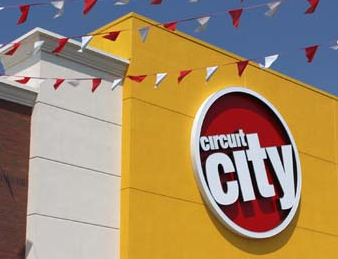Brick and Click Stores: How Circuit City Could Re-Open Its Doors

Why doesn’t a consumer electronics store work this way, in the age of the Internet?
You walk into the digital photography section. On a slanted shelf sit 15 different cameras, each tied to its stanchion for security. But there’s a big screen behind the row of compact devices. And a keyboard in front.
You lift up a camera which interests you and the wired system senses it’s the Nikon Coolpix S10. Up on the screen appears pictures of the camera, pictures taken by the camera, some technical specs and links to more. Maybe there’s a gallery of photos taken by the device. Or a video about some of its key features.
You put it down and pick up the next one. This time the screen automatically throws up data and images about the Samsung HZ10W. The drill repeats itself, for as many cameras as you pick up.
But, along the way, you use the keyboard to access consumer reviews of the cameras and pricing at other stores and online sites. When you’re done, you even lineup comparisons at PriceGrabber – and have a download of the data you’ve been sifting through sent to your smartphone.
The process repeats itself throughout the store. Want to look at big high-def TVs? Check. Laptop computers? Check. Printers? Check. Hey, just use them to print out the data, so you see how well they print, too. Meander over to the business section and see how well a 42-inch plotter from Hewlett-Packard actually works.
Where can you do that?
Well, Miami, Florida, is a good start for most of this. It’s a combination of brick-and-click merchandising being rolled out by Systemax Technology Group, the $3 billion a year outfit which recently purchased the assets of Circuit City and re-opened CircuitCity.com, to sell electronics to consumers online. It’s took some dings for the hard-line it took on its return policy at the reborn Circuitcity.com. But that hasn’t stopped chief executive Gilbert J. Fiorentino from starting to integrate access to the Internet into each aisle and shelf of retail stores the company operates and dubbing it Retail 2.0.
Of course, the stores that he’s started doing this in are not named Circuit City. But they do use another nationally known brand which the company also picked up, in its raise-brands-from-the-ashes approach to expansion. The Internet-based retailer is … CompUSA.
The first Retail 2.0 store with a “full Internet experience” opened in Miami in October. There are five now. All 29 CompUSA stores in Florida, North Carolina, Illinois, Texas and Puerto Rico will be converted by the end of September.
Fiorentino says early returns on the installation of online retailing in brick-and-mortar stores are encouraging. Twenty percent more customers who walked into that first Retail 2.0 store in Miami walked out buying something, than before.
Which seems perhaps counterintuitive, since Systemax – which is best known for operating TigerDirect.com, the online seller of computer products to small businesses – is opening up CompUSA to have every one of its prices checked against the lowest price on the Internet, available anywhere. And giving the customer the ability to press the buy button and purchase from a rival, before leaving CompUSA’s shopping aisles.
But that kind of rivalry has arrived anyway and everywhere. Anyone with an iPhone or similar device gets comfortable pretty fast with going to Amazon.com to check the price of almost any product in any store, to make sure the tag in front of them is realistic. Offline stores already compete every hour of every day, against online retailers, when customers are inside their walls.
One way Fiorentino wants to counter the online competition is by putting its most knowledgeable staff out front, working on machines, right in front of customers’ eyes. Almost like watching an Italian chef throw pizza in the air, CompUSA’s tech benches are now at the front of the store in the open. You get to see repairs being made and ask the techies questions. Consult with them, before you go shopping, if you want.
And if you buy something in the store, the installation is free, if you brought your laptop or desktop with you. No more paying $49 for five minutes work installing a higher-capacity hard drive in your machine.
But it’s the integration of the Internet, and all the resources it can put at the shopper’s fingertips, that is really noteworthy.
“If you put the digital presence next to the product in a retail space, then you have the best of both,’’ said Conor Brady, vice president, creative, for the digital marketing agency Organic.
And, you’re changing the name of the game from pure price competition, to education and information. “You’re offering a service back” that can make you what Brady would call a “branded utility.”
“Circuit City delivered those facts to my phone and got me educated and kept me educated as I was comparing it against other cameras and now, when I am ready to buy, Circuit City is front of mind,’’ he said.
This could put Circuit City “in a different game and the perception of them completely changes’’ from a bankrupted old brand to a new one committed to a high level of customer service.
Now Systemax hasn’t committed to opening even a single Circuit City store with the Retail 2.0 approach (or not). But Fiorentino acknowledges that Systemax has the right to use the Circuit City name for retail stores, if it so chooses, across the country. So he has to ask himself this, if he’s thinking his company in a few years will have hundreds of these Retail 2.0 stores handling electronics nationwide: Which brand has better name recognition – and broader applicability to all kinds of electronics? Is it CompUSA – or Circuit City?
PC Magazine, a Ziff Davis brand, is now exclusively an online publication (www.pcmag.com). It covers cameras and all things digital. But it has always fought the notion that it is just about computers. Don’t know why that is. Could be something about the name. That is the essence of the brand put forward.
So the betting is here that Retail 2.0 does succeed. That hundreds of stores do result. That other types of businesses (think office supplies and high-end sporting goods) follow suit.
But that, in Systemax’ case, the CompUSA stores get converted, one more time. This time to … Circuit City stores.
The 2.0 versions.
